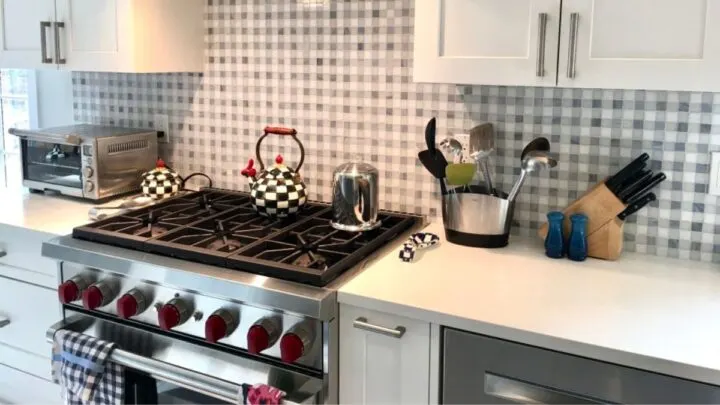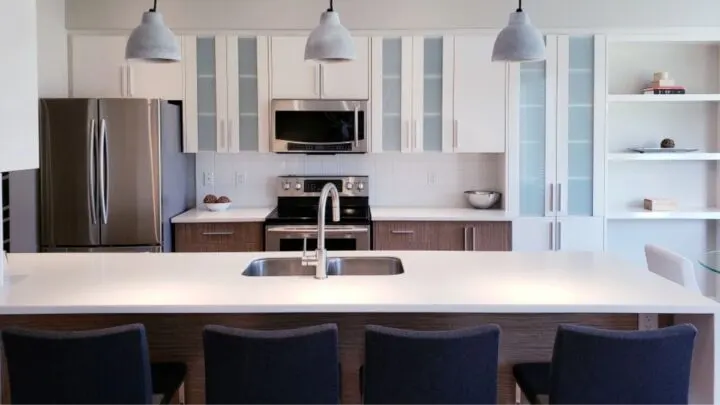Renovating your kitchen can be daunting. Besides cabinets and appliances, worktops rank among the most valuable renovation items.
As choosing countertops involves a significant financial investment, you want to be completely sure about this choice.
That being said, quartz tends to be the perfect material for countertops and white quartz, a sleek and contemporary option, is the cherry on the top.
Nowadays, quartz is quickly becoming the top choice as its beauty lasts longer and generally requires low maintenance.
Not only this, they have a wide range of textural variety to choose from, which is a great bonus.
Let us take a look at everything you need to know about this trendy yet timeless countertop that is making its way into everyone’s dream kitchen design!
White Quartz Countertop Pros & Cons
Before we start with other details on white quartz countertops, let us take a look at their pros and cons so that you can get a headstart on whether they should form part of your kitchen decor plan based on your needs requirements.
Pros
Durability: Quartz is extremely durable because of its robust construction.
Many homeowners can rest easy with white quartz countertops as they can easily retain their quality with exceptional durability and it saves your cost in the long run as you don’t have to replace them every year.
Clean and Pure: White color appears sleek and tidy. This color is a choice for those seeking pure elegance.
As it complements numerous hues and themes, they are perfect to go with every home.
Stain Resistance: Anything can fall on the countertops in the bustling kitchen. All it takes to leave a slight stain on the countertop is a drip of spaghetti sauce or chocolate.
But quartz is made of genuine material which makes them stain resistant.
They are non-porous and stains can not ooze into imaginary minuscule holes to frighten overbearing homeowners and their guests.
Cons
Low heat resistance: The low heat resistance of quartz is one of its flaws. In contrast to granite, it is more easily damaged by heat.
Kitchen workers should keep in mind that removing heat stains from white counters might be costly.
Difficulties in installation: They are particularly heavier which makes them difficult to install.
They need to be reinforced strongly and the process should be carried out by professionals only to have a finished look.
Are White Quartz Countertops a Good Idea?
Though picking a countertop is a personal decision, there are several things to take into account.
Many people prefer to go with white quartz because of its striking, long-lasting, incredibly tough, and simple to maintain qualities.
Other than this, they are highly stain-resistant, and what else do we want in our kitchens other than stain-resistant quartz?
No doubt, their scratch and stain resistance qualities, and white quartz countertops are a fantastic idea for your kitchen.
Also, the above-mentioned pros and cons will give you a better understanding to decide whether or not they are a perfect fit for you.
Is White Quartz Cheaper Than Granite?
Now that you have made up your mind to go with white quartz, you are unsure if they are more affordable than granite.
Then the good news is that you can get a quartz countertop much cheaper than granite.
Though quartz typically costs more when compared to a price per square foot, the ultimate cost will be influenced by the size, color, installation location, edge type, and other elements, which eventually makes them more affordable than granite.
It’s crucial to ensure that, when you go with quartz, the surface will be extremely durable, retain its aesthetic appeal, and require a little maintenance.
This makes you save money over time when you fix or replace countertops less frequently.

Understanding Quartz Countertop Levels
With their exceptional quality, we all are drooling over them. But it’s the substance utilized in their manufacturing that makes or breaks them.
The thickness, resin content, hues, and minerals in the quartz slab are used to define its grades or levels.
There are three main categories of quartz based on their levels:
- First Choice
- Second Choice
- Commercial
First Choice
The first choice is often created from the highest quality of quartz. They are rich in colors and provide only lines of veins.
Their price per square foot ranges from $80 to over $100. Additionally, the first choice quartz has a more marble-like smoothness.
Though the initial cost will be higher, it is compensated for the durability and brilliance they offer.
Second Choice
The second choice quartz is of beginning level. Even though they are the cheapest of all grades, they still provide the durability you expect from a real stone.
This level quartz is a great choice for cottages, starter homes, or investment properties as its price per square foot ranges from $50 to $60 per square foot.
The only disadvantage of this choice is that you might not obtain the same premium coloring or finish as you would get with the first choice.
Commercial Grade
Commercial grade is also interchangeably known as Standard Quartz. With perhaps a little less sparkle and color variety, it provides almost the same durability as compared to the First Choice.
Though it is less expensive than First Choice ranging from $60 to $80 per square foot, you will get long-lasting and sturdy stone.
Due to its endurance, commercial grades are a good choice for restaurants and hotels.
Is White Quartz Hard to Maintain?
People choosing quartz over granite or marble are often confused if they are easy to maintain. However, the reality is, for a variety of reasons, white quartz is relatively simple to maintain.
As we already discussed above, white quartz is non-porous, which makes cleaning them a breeze.
Other than this, as compared to granite and marble which are relatively porous than quartz, will absorb liquids, which would result in stains.
Also, to keep them safe from stains, you will have to reseal them regularly.
Granites are extremely heat resistant, thus placing hot pots or trays on granite countertops won’t result in lasting harm. On the contrary, if you place hot pots on quartz surfaces, they can be stained or damaged by intense heat.
Therefore, you will have to use hot pads and trivets when cooking or baking.
Furthermore, marble countertops are seen as being expensive but they are not scratch-resistance.
To prevent them from being damaged you will need to utilize cutting boards and will have to take extra care of them as compared to quartz which is easy to go with.
Do White Quartz Countertops Stain?
We all love white countertops but if the spill is not cleaned up quickly, they might become stained by coffee, red wine, tomato, tea, sauces, and many other things.
Only in these situations, the quartz countertops can not absorb the staining liquid
However, as they are simple to maintain, it makes them stainless to some extent except for the things mentioned above.
Whether you are using simple quartz or white quartz, they are not sealed to keep their resistance to stains, moisture, and other damages, in contrast to genuine stone worktops.
One of the major causes of staining is the improper cleaning of the countertops. Occasionally the chemicals used to make the kitchen sterile might indeed make it appear dirty.
So, you should avoid using any chemical that contains soap oils, solvents detergent, and paint thinners.
Additionally, avoid using cleaners that contain bleach. The best cleaning solution for your quartz countertop is a mild soap, such as dishwashing liquid.
Does White Quartz Yellow Over Time?
Over time quartz with softer tones like white might turn yellow. The resins used in the production process are typical to blame for this.
As quartz generally has poor heart and abrasion resistance, it will eventually become yellow when exposed to direct sunshine and intense heat.
Salt and surfactants are the main cause of this as they tend to react which ultimately makes your white quartz look yellow.
As a result, your white quartz countertops that stay in sunlight for a longer time will start to yellow over time.
And the bad news is that these yellow stains are irreversible and persistent.
What Are Quartz Countertops Made Out Of?
Though granite was a popular choice for many people when stone countertops initially gained popularity, in recent years, quartz countertops are becoming very popular.
Quartz is a real stone that has been sealed and processed using a protective resin, as opposed to granite, which is cut from a natural stone and then sealed.
It is formed with synthetic material through a manufacturing process that blends roughly 95% ground natural quartz with 5% polymer resins.
As a result, quartz countertops can take on colors, patterns, and appearances that are simply not possible with other genuine stones.

Final Word on White Quartz Countertops
White quartz countertops are the ones that everyone desires to have, and their exceptional beauty and aesthetic appeal make them everyone’s favorite.
Their easy-to-maintain quality is the cherry on the top which gives them a finished look even after years of renovation making them look like fresh pieces.


